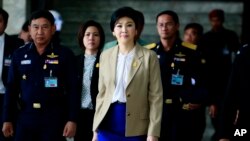Thailand is lifting a state of emergency put in place two months ago to deal with anti-government protests that are now dwindling.
Senior Thai officials said the move is being made both because of the decreasing number of demonstrations and to help improve tourism.
Political violence has killed 23 people and wounded hundreds more since November, when the opposition protests broke out.
The protesters once occupied large parts of Bangkok, but now are concentrated mainly in a central park in the capital.
They are calling for Prime Minister Yingluck Shinawatra to step down, saying her government is hopelessly corrupt.
Thai officials said the state of emergency will be replaced Wednesday by another less severe special law: the Internal Security Act.
The new decree still allows security forces to deal with protesters using curfews, security checkpoints, and other limitations.
Police had been unable to use many of the powers granted under the original emergency decree following a court ruling last month.
Although immediate pressure on Yingluck has been reduced, she still faces uncertainty over the results of a February election.
The poll was disrupted by the opposition, leaving parliament unable to fill the 95 percent of seats needed to reach a quorum and elect a prime minister.
Yingluck has also been charged by Thailand's National Anti-Corruption Commission with ignoring corruption within a government rice subsidy program that has cost the government billions of dollars.
Senior Thai officials said the move is being made both because of the decreasing number of demonstrations and to help improve tourism.
Political violence has killed 23 people and wounded hundreds more since November, when the opposition protests broke out.
The protesters once occupied large parts of Bangkok, but now are concentrated mainly in a central park in the capital.
They are calling for Prime Minister Yingluck Shinawatra to step down, saying her government is hopelessly corrupt.
Thai officials said the state of emergency will be replaced Wednesday by another less severe special law: the Internal Security Act.
The new decree still allows security forces to deal with protesters using curfews, security checkpoints, and other limitations.
Police had been unable to use many of the powers granted under the original emergency decree following a court ruling last month.
Although immediate pressure on Yingluck has been reduced, she still faces uncertainty over the results of a February election.
The poll was disrupted by the opposition, leaving parliament unable to fill the 95 percent of seats needed to reach a quorum and elect a prime minister.
Yingluck has also been charged by Thailand's National Anti-Corruption Commission with ignoring corruption within a government rice subsidy program that has cost the government billions of dollars.





